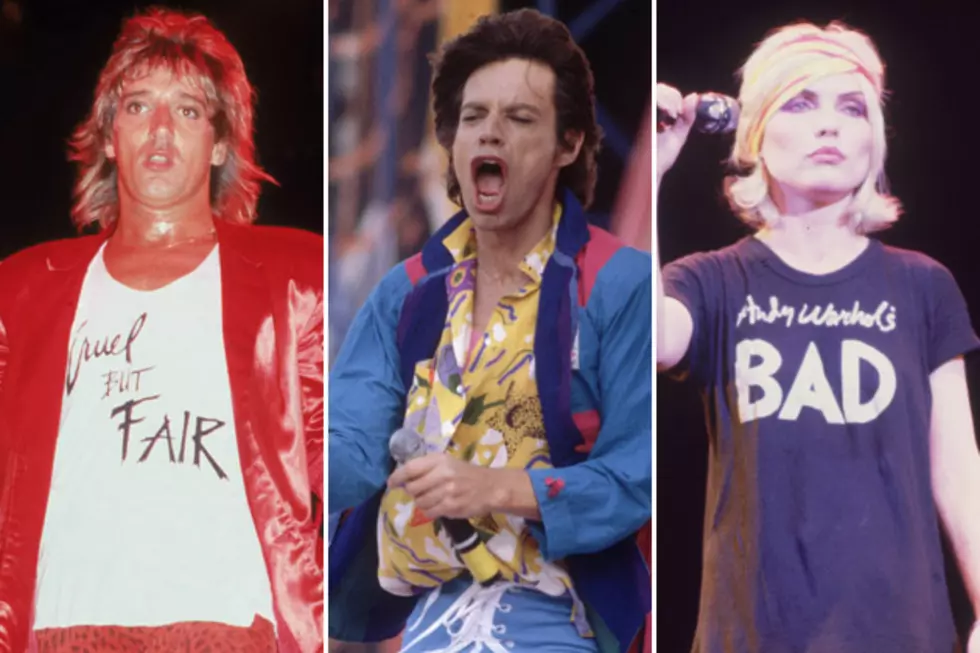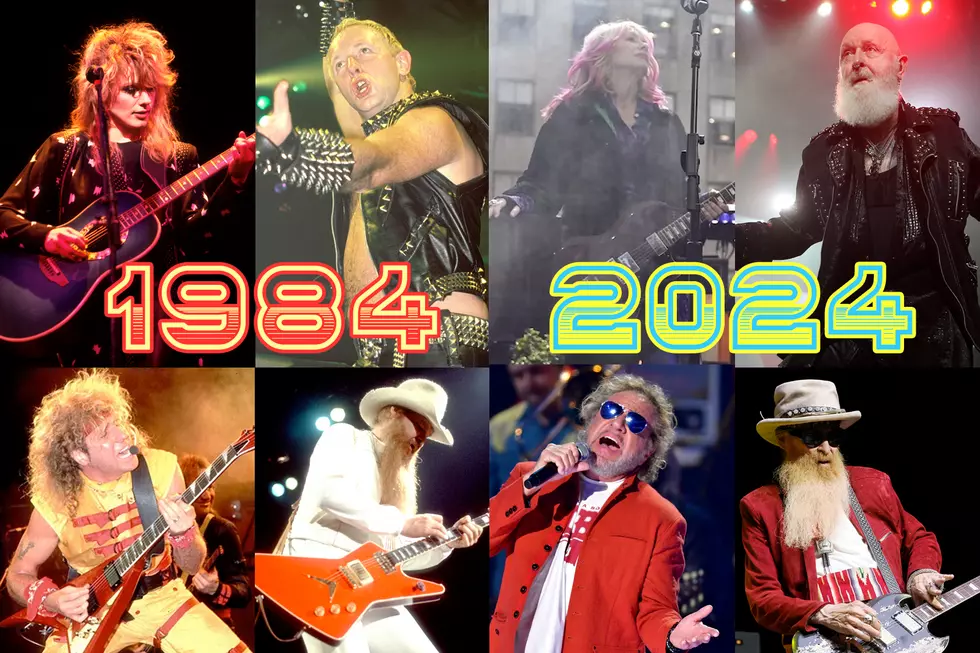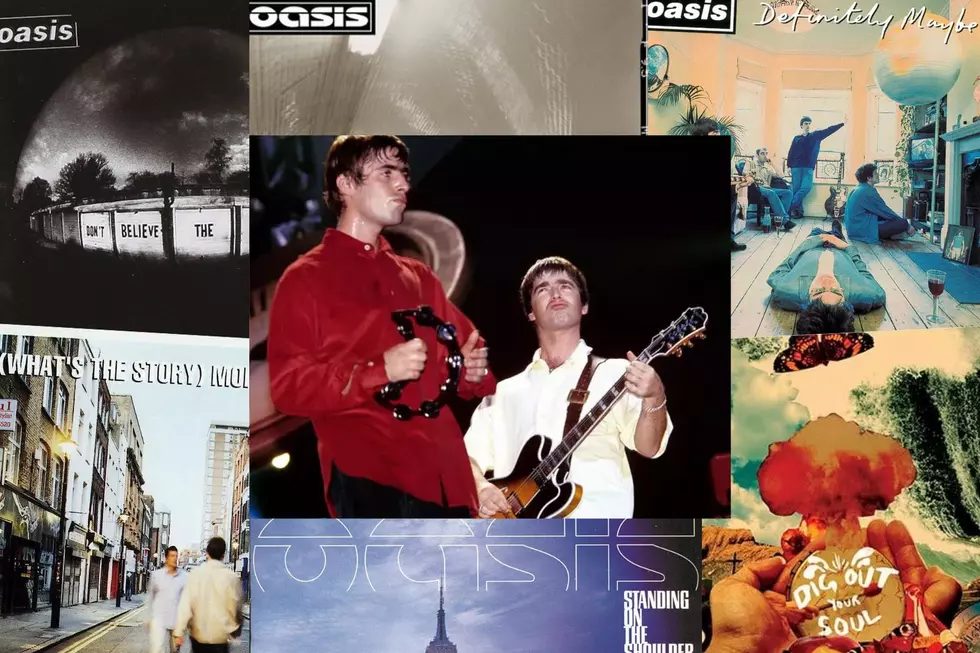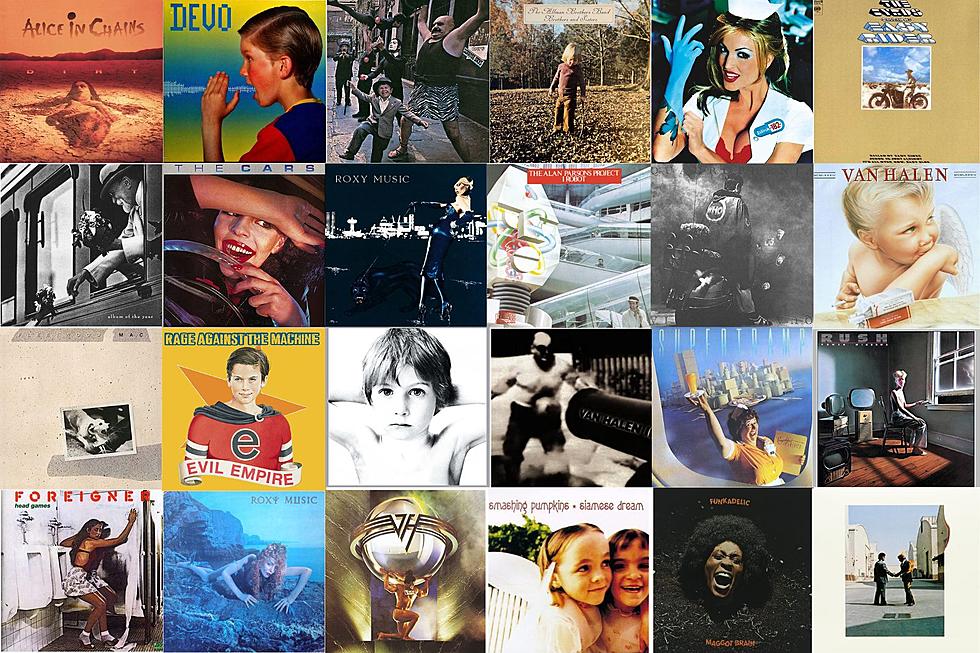
Rockers Who Jumped on the Disco Bandwagon
The earth shifted under the feet of rock fans when the 1977 film Saturday Night Fever made disco music a nationwide phenomenon. The film's hit-heavy soundtrack topped the album chart from January to July 1978.
Many classic rockers decided they'd rather switch than fight. With an ear for what was popular, bands like Pink Floyd, Kiss and ELO incorporated disco elements into their music. Here are the stories of what happened when some of rock's biggest acts of the '70s went disco, beginning with the Rolling Stones, whose transition caused their fans to believe it was a sign of the apocalypse.
The Rolling Stones: 'Miss You'
They may be the "World's Greatest Rock N' Roll Band," but the Stones produced one of the classics of the disco era in "Miss You." Fans may have felt betrayed but the cut from the Some Girls LP reached No. 1 in 1978. “I’d moved to New York at that point,” Mick Jagger told Rolling Stone. “The inspiration for the record was really based in New York and the ways of the town. I think that gave it an extra spur and hardness.”
“We didn’t think much of 'Miss You' when we were doing it,” Keith Richards said. “It’s the result of all those nights Mick spent at Studio 54 and coming up with that beat, that four-on-the-floor. And he said, 'Add the melody to the beat.' We just thought we’d put our oar in on Mick wanting to do some disco s---, keep the man happy. But as we got into it, it became quite an interesting beat. And we realized, maybe we’ve got a quintessential disco thing here.”
“'Miss You' wasn’t disco disco,” Jagger added. “Disco records at that time didn’t have guitars much, and they all had shimmering string lines and ooo-eeooo-ee girls. It was influenced by it, but not it. I like that.”
Rod Stewart: 'Da Ya Think I'm Sexy?'
Many fans believed Rod Stewart betrayed his blues and R&B roots with his 1978 disco smash, "Da Ya Think I’m Sexy?" “If you’re a songwriter, you spend your entire working life dreaming of the moment when something you have written heads out into the world and triggers a response as broadly favorable as that,” Stewart related in Rod: The Autobiography. “And yet, in the same moment, I appeared to have alienated a portion of the people who up until then had felt close to me [...] Some regarded disco as the bitter enemy, and wondered what I was doing, consorting with the other side.”
"Da Ya Think I'm Sexy?" was written by Stewart, keyboardist Duane Hitchings and drummer Carmine Appice. “Rod used to listen to the charts and say, ‘I want a song like that.’ At the time he pointed to 'Miss You' by the Rolling Stones,” Appice told Examiner. “It originally sounded pretty rock and roll, but once they put a full orchestra on there and had another girl singing two octaves higher… then everything thinned out. So it ended up not being a heavy rock disco-type of thing like 'Miss You' but ended up being more commercial.”
Though the song reached No. 1 on the charts, criticism from rock fans took its toll on Stewart. “After 'Da Ya,' for a couple of years I almost lost interest in music altogether,” the singer remembered in Rod Stewart: The New Biography. “I was just going out drinking and shagging. I believed everything I read about myself. 'Do Ya Think I’m Sexy?' Well, maybe I really am. I just got carried away with the image.”
Paul McCartney and Wings: 'Goodnight Tonight'
"Goodnight Tonight" was Paul McCartney's take on disco that featured a flamenco acoustic solo by guitarist Laurence Juber. Written for the 1979 Wings LP Back to the Egg, the dance track was deemed a poor fit and shelved by McCartney. In 1979, McCartney considered "Goodnight Tonight" as a new single but worried about critical reaction. “We decided, ‘No, it isn’t all right; we won’t put it out,’” McCartney told Rolling Stone. “So we scrapped the whole thing. And about a week later, I played the record again. I thought, ‘That’s crazy, we’ve made it; it’s stupid, why not put it out! Just because people are going to pan it.’ I liked it, and other people had taken it home and played it to people at parties. So we decided to do it.”
"Goodnight Tonight" would reach No. 5 on the charts. Wings drummer Steve Holley told Ken Michaels Radio that the inspiration for the song came to McCartney while out with wife Linda. “Apparently he’d just been out to dinner one night and they went to some discotheque somewhere and he came up with the idea and went into Abbey Road at some ungodly hour of the morning and cut that track.”
McCartney played all the instruments on "Goodnight Tonight"'s original session. The band later overdubbed guitars and percussion using McCartney’s track as a guide.
Blondie: 'Heart of Glass'
Punk/New Wave rockers Blondie were called sellouts when their disco hit "Heart of Glass" topped the charts in 1979. But singer Debbie Harry, who wrote the song with guitarist Chris Stein, told the Guardian it was not always a dance track. “'Heart of Glass' was one of the first songs Blondie wrote, but it was years before we recorded it properly. We'd tried it as a ballad, as reggae, but it never quite worked. At that point, it had no title. We just called it ‘the disco song.’
“People got nervous and angry about us bringing different influences into rock. Although we'd covered 'Lady Marmalade' and 'I Feel Love' at gigs, lots of people were mad at us for ‘going disco’ with 'Heart of Glass.' There was the Disco Sucks! movement, and there had even been a riot in Chicago, with people burning disco records. Clem Burke, our drummer, refused to play the song live at first. When it became a hit, he said, ‘I guess I'll have to.’”
The Ramones poked fun at the band for releasing a disco record but Stein remains unfazed. “We thought we were just referencing Kraftwerk,” Stein told the Red Bull Music Academy. “We really didn’t focus on the disco aspect of it. It just came out. I love that it pissed off all our peers. Because it was like us being punk in the face of punk.”
The Bee Gees: 'You Should Be Dancing'
The Beatlesque ballads of the Bee Gees – brothers Robin, Maurice and Barry Gibb – yielded a string of pop hits in the late ‘60s. But the band struggled in the ‘70s and went in a new direction: disco. "You Should Be Dancing," from the 1976 Children of the World LP, ushered the Bee Gees into the disco era. The song was one of five Bee Gees songs used in the film Saturday Night Fever.
“We didn't think when we were writing any of our music that you would dance to it,” Robin maintained in Elsewhere. “We always thought we were writing R&B grooves, what they called blue-eyed soul. So we never heard the word ‘disco,’ we just wrote groove songs we could harmonize strongly to, and with great melodies. The fact you could dance to them, we never thought about.”
The rhythm tracks of "You Should Be Dancing" were recorded at Miami’s Criteria Studios. The band then decamped to Le Studio in Quebec to record Barry’s vocals. "You Should Be Dancing" would become the band’s first No. 1 featuring Barry’s falsetto. Le Studio's André Perry told Ultimate Classic Rock how Barry achieved his trademark sound.
“To obtain that really bright falsetto sound, in tune, he would do overdubs -- 15, 16 tracks of the same overdub. It would still sound bright and nice and sweet but the vibratos would be identical. That was unique, we had never seen anybody work with such perfection. When you listen to it, it pierces through everything. It pierces through the tracks."
In those days, tracks were recorded on two-inch audio tape. Repeated rewinding for multiple takes and overdubs caused the tape to shed its oxide coating.
"And when you lose oxide, you start losing high frequencies on the tape. When came the time to mix, you would see oxide falling off the tape. And everybody started to freak out. They had to clean the heads of the tape recorder every time they ran the tape back and forth. They could have lost the whole damn thing.”
The success of Saturday Night Fever enriched the Gibb brothers but brought them a slew of criticism. “None of us really knew how to deal with it – wow, this is so unfair, all of those emotions,” Barry said in the Guardian. “Christ, if everyone else was calling you crap, how could you think of yourself as any good? It was devastating. There's part of me, a little part of me that goes, 'Jesus, man, you f---ing write something like that, I'll sit back and listen.' But the greater part of me is… I just don't care anymore. I don't feel I've got to say, 'Dammit, this was good.'”
See the Rolling Stones and Other Rockers in the Top 100 Albums of the '70s
More From Ultimate Classic Rock









